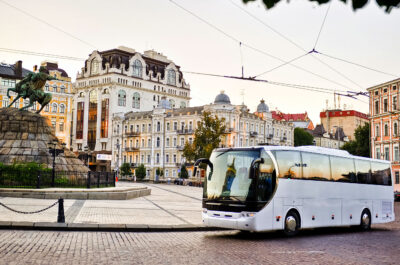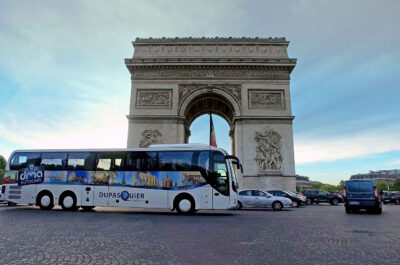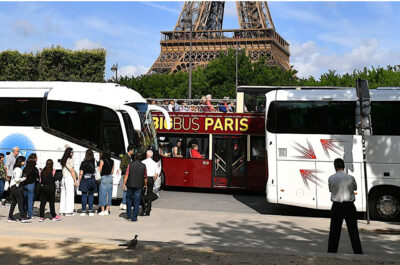EU transport ministers have approved the Council of the EU’s general approach on two key files: driving and rest time rules for coach tourism drivers and driving licence rules. This defines the Council’s position ahead of the upcoming negotiations with the European Parliament. The results are mixed.
BRUSSELS – The Council’s general approach takes small steps towards addressing driver shortages with the revision of the driving licence rules, better news is expected from the European Parliament. During the same meeting, the Council reached a historic agreement on the recognition of specific driving and rest time rules for coach tourism drivers.
Driving licence rules
The European Commission’s proposal to revise the driving licence rules provides the possibility to remove some of the major barriers to attracting more talent to the EU pool of drivers. The road transport sector is missing about 600,000bus, coach and truck drivers; and the trend is upward.
The Council, the first EU legislator to define its position on the file, recognised the potential in some respects but missed several opportunities.
Among the notable achievements, the Council supports the European Commission’s proposal to allow accompanied driving and training for truck drivers (categories C and C1) as of 17 years old. This will open the possibility for young graduates of vocational schools to safely gain driving experience under the supervision of an experienced driver. The downside is that Member States will be allowed to set different national practices.
IRU Director of EU Advocacy Raluca Marian said, “The Council’s position is both sweet and sour for truck drivers. On the one hand, most Member States have realised that allowing accompanied driving for 17-year-olds is not about decreasing the minimum driving age, as some organisations have misleadingly presented. It just helps to capture young school graduates by setting a form of paid training under the scrutiny of experienced professional drivers.
“The sour part is that the Council has made this good measure optional for Member States. We would like to see this level across the EU, as it will be for young private car drivers, since professional drivers have comparatively more training and earn their living from driving, making them much safer by default.”
Another notable achievement is that the Council has embraced the Commission’s proposal for an EU mechanism to recognise third-country driving licences. Currently, each Member State follows its own practices.
“Our sector needs more drivers. While we prioritise local talent, including young drivers and women, the gap is so big that we cannot overcome the shortage without third-country drivers,” highlighted Raluca Marian.
“We are happy that the Council has agreed to have a harmonised EU practice for the recognition of foreign professional driving licences. However, as IRU has repeatedly stated, this only solves half of the problem. A professional driver cannot drive in the EU unless it also has a recognised Certificate of Professional Competence (CPC). Therefore, despite its efforts, the Council has failed to solve the issue,” she added.
Unfortunately, the Council has also missed the opportunity to meet the needs of collective passenger transport, such as removing the arbitrary 50-kilometre limit for professional bus and coach drivers under 21 years old.
“While there has been some progress, important solutions are missing from the Council’s general approach. We hope the European Parliament will bring a better version of the driving licence rules to the trilogue negotiations,” concluded Raluca Marian.
Coach tourism driving rules
Mobility Package 1 negotiations resulted in a last-minute deal among legislators who focused mainly on goods transport, leaving coach tourism drivers with driving and rest time rules not suited to their work.
From the very beginning, IRU welcomed the European Commission’s proposal to set specific rules for coach tourism, which is a step in the right direction that will benefit coach tourism drivers, passengers and operators.
The Council’s general approach largely embraced the Commission’s proposal. Most importantly, it allows coach tourism drivers to:
- Split their 45-minute break into shorter breaks of at least 15 minutes, depending on the duration of the daily driving time,
- Extend their duty time by an hour once or twice, depending on the duration of the trip, with full compensation, and
- Drive for 12 consecutive days on national trips and recuperate the skipped weekly rest after the trip, which is already possible for international trips.
“We welcome the Spanish Presidency’s deal in the Council. This opens the way for a speedy trilogue negotiation between the European institutions, bearing in mind the positive vote in the Parliament’s Transport Committee on the dossier last month,” said Raluca Marian.
“Recognising the specific way that coach tourism drivers work and allowing them to adapt their driving time and breaks to the specific patterns of their industry will improve safety and working conditions, boosting the attractiveness of the profession for this environmentally friendly mode of transport,” she concluded.
Theodore is the Co-Founder and Managing Editor of TravelDailyNews Media Network; his responsibilities include business development and planning for TravelDailyNews long-term opportunities.

































































































































































































